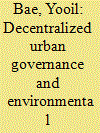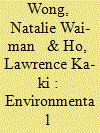| Srl | Item |
| 1 |
ID:
128524


|
|
|
|
|
| Publication |
2013.
|
| Summary/Abstract |
This paper explores how decentralization has created a "local political arena" and has been transforming governance in the environmental management sector in South Korea. Korea has been known as a developmental state where the strong central government and businesses have conspicuously dominated during most of its industrialization period. Yet, the deepened democracy, global competitiveness and fiscal austerity have pressured central political stakeholders to devolve highly centralized functions and authority to local bodies since the mid-1990s. The building of democratic institutions at the local level, including directly elected mayors and city councils, has created room for local politics and diminished central political leverage over local affairs. The national economic crisis has highlighted the inefficiency of the centralized system and encouraged further administrative and fiscal decentralization under the democratic governments. In this issue image_86_4_Baecontext, while the central government and big businesses continue to have a significant say in policy making, local executives, with their expanded decisional authority and resources, are trying to improve the images of their cities and to take responsibility for promoting urban economies and improving quality of life in the age of trans-border links and competition. This paper analyzes the case of Ulsan, where Hyundai and several other conglomerates are located and which has been a symbol of state-led industrialization during most of the development period. Despite the large role played by the centre in the development of Ulsan, the empowered mayor of the city has successfully turned citizens' attention to post-industrial aspects of governance for ensuring the future competitiveness of the city in global markets by orchestrating collaborative implementation of environmental policies. The paper explores how this governance shift in Ulsan has led successful collaborative environmental change by mobilizing local businesses, civic organizations and general citizens who might not have been interested in the making of an "environment-friendly city
|
|
|
|
|
|
|
|
|
|
|
|
|
|
|
|
| 2 |
ID:
178447


|
|
|
|
|
| Summary/Abstract |
Both Hong Kong and mainland China are affected by illegal electronic waste disposal and transfers, which negatively impact ecosystems and human health. The Chinese government has signed the Basel Convention, while Hong Kong has not enforced the Chinese policies but implements separate control policies under the "one country, two systems" framework. As seen in other transboundary environmental collaborations, both the Hong Kong and Chinese governments have made collaborative efforts to tackle electronic waste movement, but institutional constraints have hindered the effectiveness of cross-border environmental collaboration. This study aims to understand interagency relationships between Hong Kong and mainland China since the sovereignty resumption in 1997, and examines the interagency collaboration of two different political systems within China, from a meso-level perspective. The authors raise the following questions: How have the Hong Kong and the Chinese governments managed electronic waste in addressing cross-border environmental problems? How have institutional constraints hindered the tackling of cross-border electronic waste movement? What are the lessons learnt from cross-border air and water quality management for electronic waste control? Built on the concept of interagency collaboration, a framework for assessing cross-border interagency collaboration is proposed for an enhanced understanding of the interagency relationships between two different political systems within a country.
|
|
|
|
|
|
|
|
|
|
|
|
|
|
|
|